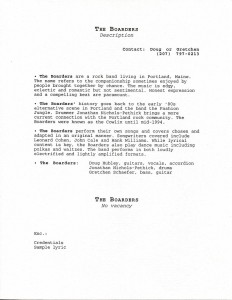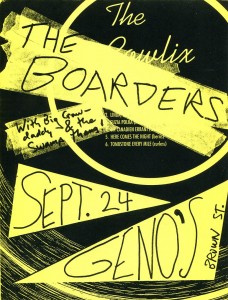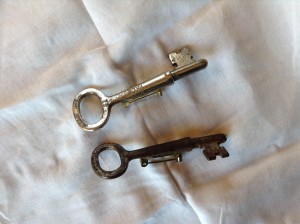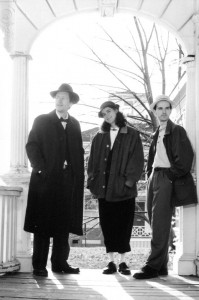The Boarders, All Keyed Up
![Late in the 1860s novel Little Women, heroine Jo March, dreading her friend Laurie’s budding romantic feelings for her, tells her mother she feels “restless and anxious to be seeing, doing and learning more than I am.” Her solution is to move to the city, to live and work in a boardinghouse. There, she has a room to herself, time to write, and the welcome distraction of friendships with her fellow boarders. — Ruth Graham, The Boston Sunday Globe, Jan. 12, 2013 [Week of March 24] Boarders Let's begin with something deceptively obvious. Larger musical groups are empowered by their capacity for complexity. Smaller bands are empowered by the need to keep it simple. Obvious, for sure, but for the musicians involved, it's a powerful reality that encompasses infinite subtleties in both directions -- perhaps unexpectedly so in the case of the minimal. The richness of potential there can be highly gratifying. Every time I have gone from a larger to a smaller band, I've felt suddenly light, ready to fly. This was especially true in the case of the Boarders, the trio remaining after two musicians departed our so-called country band, the Cowlix. Singer Marcia Goldenberg left in March 1994 and violinist Melinda McCardell in May, after one last gig. My fellow remnants were Gretchen Schaefer, who played bass and guitar, and drummer Jonathan Nichols-Pethick. I played guitar and accordion, proposed much of the material and sang most of it. Post-Cowlix, we wasted little time finding a direction. And circularly enough, our direction was to be the Boarders. Atop a hard core of held-over Cowlix country and folk-dance repertoire, we added pop-rock by Buddy Holly, Jackson Browne and others. I was gratified to add two songs by Tim Hardin, one of my first big influences, to the repertoire. We learned two by the Kinks; the Oysterband's brilliant "When I'm Up"; Anne Savoy's adaptation of the Cajun song "Mon Chere Bebe Creole." From the torch song catalog came "What's New" and "I'll Be Seeing You." We glommed up enough Leonard Cohen to jokingly bill ourselves as Portland's only L.C. tribute band, even tackling the French Resistance anthem "The Partisan," which Lennie covered on his second album. And we revived several originals by my pre-Cowlix combo, the loudly romantic Fashion Jungle. Speaking of which, among other improvements that came with the Boarders, it was here that I felt at home as a songwriter again after five years adrift. It was ironic, or at least telling, that toward the end of the 'Lix I was thinking about revisiting Fashion Jungle material (and we even picked up "Shortwave Radio"). Apparently I am on a short chain fastened to a post in the ground, because I walk in one direction until the chain is wrapped completely around and then I wind it again the other way. In the four years of the Cowlix, I wrote two songs: "Slow Poison" and "Trouble Train." In the two years of the Boarders, I wrote three, including two that I consider among my best, "1,000 Pounds of Rain" and "Watching You Go." And for the first time since the Fashion Jungle, I wasn't the only songwriter in the band. We hung onto Jonathan's "All Over," and he and his wife, Nancy Nichols-Pethick later presented "Tragedy." Nostalgia wears rose-colored contact lenses, but it seems to me that our musical interests were as harmonious as everything else about the Boarders. I don't recall Gretchen, Jonathan and me ever discussing our repertoire in broad or aspirational terms, and neither did we disagree about material. We just brought songs in and, for the most part, played them. It was a relief to lose the country music fiction espoused by the Cowlix, a band with a long stylistic reach and a grasp that almost matched. As previously noted, I, at least, had started violating the "country" descriptor early on. And now here were the Boarders with no such mandate to obey or defy. Like the Cowlix, we had the range to pull off a variety of music, but there was a crucial difference: What the 'Lix lacked and the Boarders possessed was a collective personality focused enough to forge an identifiable sound from some disparate types of music. Much of that personality was purely musical and organic, but -- and I know it will shock and surprise you that such things happen in the music biz -- some slight contrivance went into the Boarders' public identity. The three of us had zero interest in retaining the Cowlix name. Not only did we wish to leave the past in the past (as I am obviously so dedicated to doing), but we had discovered along the way that we weren't the only ones using that name. Pretty obvious moniker for a country band, after all. I don't recall where or how "Boarders" turned up, but it seemed sufficiently random-yet-meaningful, that irresistible combination, to work for this "new" band that seemed capable of anything. The richness of the Boarders' prospects and potential, coupled with my decade-plus experience, as a music journalist, with musicians angling for my attention, prompted a fairly focused publicity campaign. We even created press kits, including a band history (remarkably free of factual content), demo tapes, a sample lyric ("Trouble Train"), publicity photos by longtime friend Jeff Stanton -- and a key pin. Key pin? Just like it sounded: an old-fashioned lever-lock key with a pin-back epoxied onto it, so it could be worn as a pin. The key concept was derived from the boardinghouse concept, and the whole works was derived from my realization that journalists and club owners would be more likely to remember a band that gave them presents. Who doesn't like presents? I have no idea whether the key pins made any difference to our getting work -- although we did get work. But, revisiting the two key pins that I still have from that exciting Boarders efflorescence 20 years ago, I would like to think there are still a few Boarders key pins turning up, from time to time, on the sport jacket lapels and cloche hats of Portland's hip-and-cool.](https://www.dhubley.com/wp-content/uploads/2014/03/Boarders-JS-LEDE-1024x680.jpg)
The Boarders in an autumn 1994 publicity image. From left, Doug Hubley, Jonathan Nichols-Pethick, Gretchen Schaefer. Jeff Stanton photo.
Late in the 1860s novel Little Women, heroine Jo March, dreading her friend Laurie’s budding romantic feelings for her, tells her mother she feels “restless and anxious to be seeing, doing and learning more than I am.” Her solution is to move to the city, to live and work in a boardinghouse. There, she has a room to herself, time to write, and the welcome distraction of friendships with her fellow boarders.
— Ruth Graham, “Boardinghouses: where the city was born,” The Boston Sunday Globe, Jan. 12, 2013
Never mind literary classics! Go directly to throbbing rock rhythms!
Let’s begin with something deceptively obvious.
Larger musical groups are empowered by their capacity for complexity. Smaller bands are empowered by the need to keep it simple.
Obvious, for sure, but for the musicians involved, it’s a powerful reality that encompasses infinite subtleties in both directions — perhaps unexpectedly so in the case of the minimal. The richness of potential there can be highly gratifying. Every time I have gone from a larger to a smaller band, I’ve felt suddenly light, ready to fly.
My fellow remnants were Gretchen Schaefer, who played bass and guitar, and drummer Jonathan Nichols-Pethick. I played guitar and accordion, proposed much of the material and sang most of it.
Post-Cowlix, we wasted little time finding a direction. And circularly enough, our direction was to be the Boarders.
Atop a hard core of held-over Cowlix country and folk-dance repertoire, we added pop-rock by Buddy Holly, Jackson Browne and others. I was gratified to add two songs by Tim Hardin, one of my first big influences, to the repertoire.
We glommed up enough Leonard Cohen to jokingly bill ourselves as Portland’s only L.C. tribute band, even tackling the French Resistance anthem “The Partisan,” which Lennie covered on his second album.
And we revived several originals by my pre-Cowlix combo, the loudly romantic Fashion Jungle.
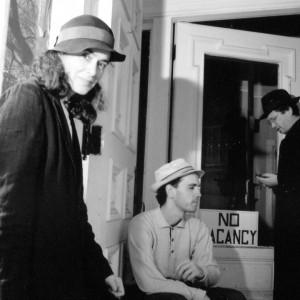
Another image from the autumn 1994 Boarders publicity shoot by Jeff Stanton. The setting was Jeff’s apartment house on Portland’s Eastern Promenade. From left: Gretchen Schaefer, Jonathan Nichols-Pethick, Doug Hubley.
Speaking of which, among other improvements that came with the Boarders, it was here that I felt at home as a songwriter again after five years adrift. It was ironic, or at least telling, that toward the end of the ’Lix I was thinking about revisiting Fashion Jungle material (and we even picked up “Shortwave Radio”).
In the four years of the Cowlix, I wrote two songs: “Slow Poison” and “Trouble Train.” In the two years of the Boarders, I wrote three, including two that I consider among my best, “1,000 Pounds of Rain” (excerpted above and available in its entirety at my Bandcamp store) and “Watching You Go.” A pathetically small total by any standard, but I’m just sayin’.
And for the first time since the Fashion Jungle, I wasn’t the only songwriter in the band. We hung onto Jonathan’s “All Over,” and he and his wife, Nancy Nichols-Pethick later presented “Tragedy.”
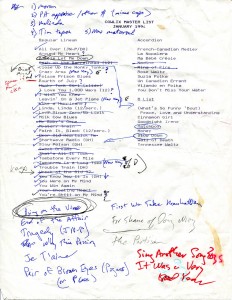
What started out as a master list of all Cowlix repertoire shows the transition from ‘Lix to Boarders. (Hubley Archives)
It was a relief to lose the country music fiction espoused by the Cowlix, a band with a long stylistic reach and a grasp that almost matched. As previously noted, I, at least, had started violating the “country” descriptor early on.
Much of that personality was purely musical and organic, but — and I know it will shock and surprise you that such things happen in the music biz — some slight contrivance went into the Boarders’ public identity.
I don’t recall where or how “Boarders” turned up, but it seemed sufficiently random-yet-meaningful, that irresistible combination, to work for this “new” band that seemed capable of anything.
The richness of the Boarders’ prospects and potential, coupled with my decade-plus experience, as a music journalist, with musicians angling for my attention, prompted a fairly focused publicity campaign. We even created press kits, including a band history, demo tapes, a sample lyric (“Trouble Train”), publicity photos by longtime friend Jeff Stanton — and a key pin.
Key pin? Just like it sounded: an old-fashioned lever-lock key with a pin-back epoxied onto it, so it could be worn as a pin. The concept of the key came from the boardinghouse theme — every boarder must have a key, yes? — and it worked on so many levels! Etc. But the grand idea was derived from my having learned that journalists and club owners would be more likely to remember a band that gave them presents. Who doesn’t like presents?
I have no idea whether the key pins made any difference to our getting work — although we did get work. But, revisiting the two key pins that I still have from the Boarders’ exciting blossoming 20 years ago, I would like to think there are still a few Boarders key pins turning up, from time to time, on the sport jacket lapels and cloche hats of Portland’s former hip and cool.
Hear the Boarders’ first recordings, from August 1994.
Three 1994 demo recordings by the Boarders, featuring the first song I wrote for the band, “1,000 Pounds of Rain,” and two revivals from the Fashion Jungle repertoire. Of minor interest is the fact that this is the last two-track recording I made of any of my electric bands, as I moved to the four-track audiocassette format in December 1994.
- 1,000 Pounds of Rain (Hubley) The title was inspired by a 1990 Cowlix performance at the Drydock, which necessitated our carrying the equipment to the second-story performance area up a cast-iron fire escape in a pouring rain. I lugged the title around for years not knowing what the song would be about. Finally finished in spring 1994, around the time the ‘Lix were splitting up, “1,000 Pounds” turned out to be a cry of despair at reaching middle age. Incidentally, drummer Jonathan Nichols-Pethick first heard us at the Drydock date and joined the ’Lix a year later.
- Je t’aime (Hubley) An interpretation, somewhat unfair, of an affair I had with a Swedish girl in 1976. For the song, nationalities were changed because, well, Paris, you know. Although, or because, I distorted the facts to save face, I still regard it as one of my best songs. Written in 1982 and originally performed with the Fashion Jungle, this song came into its own with the Boarders.
- Breaker’s Remorse (Hubley) Hearing the expression “buyer’s remorse” for the first time in 1987, I parlayed it into a song about someone who needs encouragement expressing herself. This late Fashion Jungle number was an early addition to the Boarders songbook.
“1,000 Pounds of Rain” copyright © 1995; “Je t’aime” copyright © 1983; “Breaker’s Remorse” copyright © 1995, all by Douglas L. Hubley. Notes From a Basement text copyright © 2012–14 by Douglas L. Hubley. All rights reserved.
